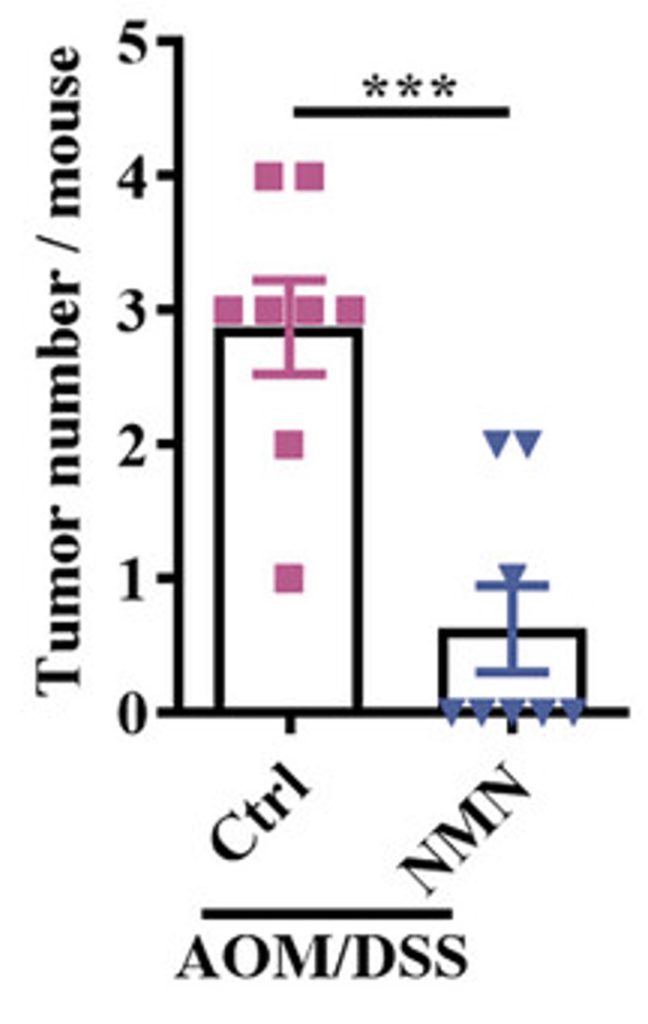NMN Protects Against Colon Cancer, New Study Finds
NMN lowers colon tumor incidence more than 3-fold in a mouse model for colon cancer.
Highlights:
- NMN injections prevent the development of colon tumors in a mouse model for colon cancer.
- NMN reduces biological drivers of aging, including inflammation, in the colon of colon cancer mice.
Colorectal cancer — colon and rectal cancer — is the third leading cause of cancer-related death globally. For this reason, compounds that prevent the development of colorectal cancer may lead to a longer life. Now, scientists have found that the NAD+ precursor NMN may be a candidate for such a compound.
To model colon cancer, researchers injected mice with a carcinogenic compound called azoxymethane. Another chemical called dextran sulfate sodium was also placed into the drinking water of the mice to induce colon inflammation and tumor growth. While some of these colon cancer mice received injections of NMN, for comparison, others did not receive NMN. The results showed that, compared to the mice not injected with NMN, the NMN-injected mice had fewer tumors in their colon. These findings suggest that NMN contributes to preventing the development of tumors in the colon of mice.

People with inflammatory bowel disease are particularly prone to colorectal cancer due to chronic gut inflammation. Older individuals also tend to have higher levels of gut inflammation. Inflammation leads to oxidative stress, an underlying driver of aging, whereby molecules called reactive oxygen species (ROS) damage cells. Chronic oxidative stress triggers DNA damage that leads to the genetic mutations, and these mutations can lead to cancer.
The researchers found that untreated colon cancer mice had elevated markers for DNA-damaging oxidative stress and inflammation in their colon tissue. However, the NMN-injected colon cancer mice had lower levels of these markers, suggesting that NMN mitigates gut inflammation and oxidative stress. These findings reveal that NMN may potentially prevent the development of colon tumors by reducing intestinal inflammation and oxidative stress.
Can NMN Stop Tumors by Boosting the Immune System?
While the above study suggests that NMN can counteract cancer by reducing inflammation and oxidative stress, NMN may also combat cancer by boosting the immune system. This is because our immune system plays a critical role in mitigating cancer.
One way the immune system fights cancer is via natural killer (NK) cells, which are immune cells that directly kill cancer cells. However, the number of NK cells we have declines with age. Moreover, studies have shown that populations with low NK cell activity have a higher risk of developing cancer. Low NK cell activity is also associated with higher mortality rates from infectious diseases in elderly subjects. One study has shown that NMN boosts the immune system of mice by enhancing NK cell activity.
Another type of immune cell called a T-cell also aids in combating cancer. Several types of cancers occur as a result of T-cell dysfunction, including certain types of non-Hodgkin lymphoma. NMN has been shown to effectively prevent T-cell dysfunction, thus halting tumor growth in mice. While T-cells and NK cells help to reduce tumor growth, immune cells called macrophages, in their activated form, contribute to cancer progression by promoting inflammation. NMN has been shown to reduce macrophage activation and inflammation.
Together, these studies suggest that NMN may potentially prevent the development of cancer by reducing oxidative stress and boosting the immune system. The question of whether NMN can prevent cancer in humans will need to be answered with more studies.
Model: Male C57BL/6J exposed to chemicals that trigger colon cancer
Dosage: 500 mg/kg injections of NMN every other day

